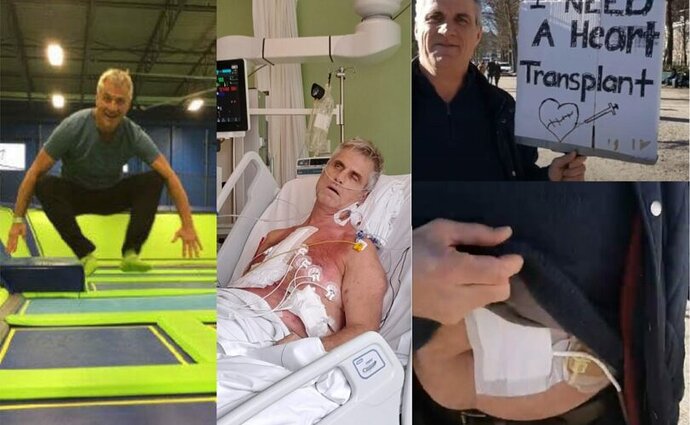Dutch-Canadian develops heart failure after taking COVID booster to comply with travel mandates
A Dutch-Canadian man developed severe heart failure and now requires a heart transplant, a condition which developed shortly after taking the booster shot of Pfizer’s Coronavirus Disease 2019 (COVID-19) mRNA gene therapy vaccine in order to meet pandemic era travel requirements to enter Canada to see his children.
Before heart failure changed his life forever, Alex van Kooten was an otherwise extremely healthy and fit 52-year-old who frequently enjoyed sports and leisure activities, such as skiing, bicycle racing, and kite surfing.
Alex, who was born in the Netherlands, immigrated to Canada with his parents at the age of 9, spending most of his life in the Toronto and London regions of Ontario before relocating to the Caribbean after completing his professional career.
Once a corporate salesperson and sales manager for companies such as Hilti and Black & Decker, Alex and his wife decided it was time for a change and moved to Aruba to manage property in 2017.
Trapped in paradise
For the couple, once the COVID-19 pandemic began and worldwide lockdowns started to hit in the beginning of 2020, leaving the island suddenly became off the table.
Seemingly overnight, Aruba had transformed from a sunny island paradise into a 180 square kilometer waiting area.
“I had worked very hard in my life at an early age, and decided to semi-retire,” Alex told Vision Times. “That’s why we moved to Aruba to enjoy the weather, and then COVID hit, and needless to say that we were kind of stuck.”
Alex continued, “And we’re hoping, obviously, that things would go better. We had our own little business there with vacation homes, and of course with the lockdowns, that didn’t go very well.”
“And then finally, after two years of not seeing the children, the only option we had to see the children was to get vaccinated in order to get back into Canada,” he added.
But plans to return home to visit with their adult children proved difficult to arrange. At the end of January of 2021, the Government of Canada declared it was suspending travel from Caribbean countries, effective until the end of April.
A press release by Transport Canada at the time announcing the Caribbean suspension also told the public that “all air travelers arriving in Canada, with very limited exceptions, must reserve a room in a Government of Canada-approved hotel for three nights at their own cost.”
Mandatory quarantine on arrival in a first world country was before then effectively unprecedented. And as vaccine passports began trending in a number of countries around the world, Alex started to feel that the writing was on the wall and it was only a matter of time until his wish to return to Canada to see family would be predicated on getting vaccinated.
“I wanted to see my children in a bad way after two years…That’s not a fun thing,” he said.
Alex continued, “You know, I’m feeling like we were trapped. It sounds like you’re in paradise where you’re invited, but trust me, you feel trapped [in Aruba], even though it’s sunny every day.”
A tough decision
Alex told Vision Times that he had reservations about both the vaccines and the risk of serious illness from COVID for people as healthy as he was, “I was very reluctant. I’m not an anti-vaxxer, but I’ve always been against the flu shot. And this [COVID], to me, was always a flu,” he said.
“And it didn’t make a lot of sense for healthy people, which I was extremely healthy, to get a vaccine for something that maybe would make me sick for a few days,” Alex added.
“Not knowing when you could resume a normal life…You feel pressured in doing so [getting vaccinated],” Alex said. “I could have waited for another two years, and then [he felt like] maybe I would have been able to see my children after four or five years if they ever removed restrictions. But there’s no guarantee of that,” he added.
So he rolled up his sleeve for the first dose of the Pfizer-BioNTech COVID-19 vaccine in March of 2021 in anticipation of Canada’s Caribbean restrictions being lifted.
And the appointment came and went without any issue, “After the first injection, it just had a bit of a sore arm. I didn’t make a big deal of it,” he said.
But when Alex took the second course of the vaccine required for fully vaccinated status in May of 2021 right before leaving for a trip to Holland, shortly after they had arrived, he immediately began to notice something was wrong.
Heart palpitations and a shortness of breath were the first troubles he experienced, “And two, three days after I arrived in Holland, we go for our first walk. We took our dogs…and I had to tell my wife to slow down because I was out of breath,” he said.
Alex explained the issue was exceptionally prominent for him, since as part of his exercise routine, Alex liked to traverse the Hooiberg hiking trail in Aruba, which involves a 2,500 step climb across a concrete staircase to the top of Mount Hooiberg, a path he had long since mastered.
“At first, I didn’t think much of it, but then [the symptoms] were just on an ongoing basis,” he added.
When the palpitations and breathing issues did not abate, Alex’s doctors in the Netherlands sent him for an EKG. But when the test came back clean, he was told what he was experiencing was psychological and probably only stress related.
“So I lived with this for almost six months. Went back to Aruba, went to the doctor there a few more times because of the issues, same scenario,” he added.
Boosted
Alex was fortunate in that during the first trip, he was able to visit Canada to visit with family in August of 2021 before returning to Aruba in December.
The plan at the time was to visit Canada again in April of 2022.
Canada ultimately mandated vaccine passports as a condition of entry at the end of October of 2021.
Thus, when Alex and his wife returned to the Caribbean, they watched as countries such as France started requiring a booster injection to maintain fully vaccinated status, and so they decided that if he wanted to continue to travel as the pandemic situation evolved, it was prudent to stay ahead of the curve.
So in March of 2022, Alex made his appointment for his Pfizer booster right before leaving Aruba for another 6 week trip to the Netherlands as part of an itinerary that finished in Canada.
But after arriving in Holland, that’s when Alex’s life changed, “Instead of coming to Canada, I ended up in the ICU at the University Hospital in Groningen,” he stated.
He told Vision Times that just days after taking the booster shot he became unable to lie down “without gasping for air and was barely able to walk 20 feet.”
Alex also started gaining weight. A lot of weight. 30 kilograms (66 pounds) was suddenly added to his frame, which doctors later discovered was caused by water retention.
As his symptoms both persisted and worsened throughout his Netherlands vacation, Alex continued to visit local physicians roughly twice per week, “They all said the same thing. You know, we’d go two, three times a week to the doctor, and they said ‘No, no…We’re going to make an appointment with a psychologist for you.’”
‘Wasn’t expected to survive’
When his suffering escalated, Alex found himself in an ambulance en route to a hospital in Harderwijk, where he lost consciousness.
He awoke to find himself in a specialist hospital in Groningen under the care of a cardiologist.
“I wasn’t expected to survive when I was in the hospital on Wednesday night. I woke up on Thursday morning, but on Wednesday night they had called the family to say goodbye because they didn’t expect me to make it through the night. I beat the odds,” he said while describing his experience.
Alex recounted the first time he spoke with the doctor, “And he says, ‘Oh, you’re very sick, sir. How long have you been a heart patient?’ And I’m like, ‘Heart patient? What are you talking about?’”
It turned out that the water retention and the acceleration of Alex’s symptoms appeared to be linked to kidney and liver failure. His kidney functions had been reduced to just 8 percent of their normal capacity.
But when doctors couldn’t find a direct cause, they started to look for heart and artery blockages.
And it was then that they made a shocking discovery: There wasn’t any blockages. Instead, Alex was suffering from a case of heart inflammation so severe that his aortic valve had completely calcified.
He said that doctors described the degree of calcification as one “normally associated with having major heart issues for years.”



